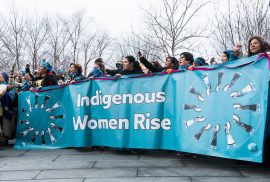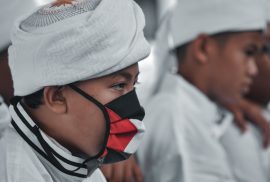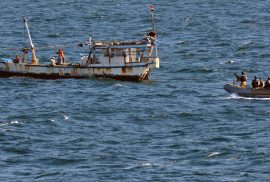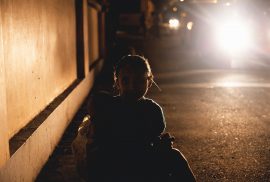The Universal Declaration of Human Rights (UDHR) adopted in 1948 by the international community,proved that human rights were being accepted as universal norms that needed to be respected, protected, and promoted. The phrase in the UDHR “All human beings are born free and equal in dignity and rights” means that everyone is equal in claiming their rights without distinction. This is supported by the first paragraph of the Vienna Declaration and Programme of Actions preambular, where it recognizes human rights as a universal norm by stating that “All human rights are universal, indivisible and interdependent and interrelated.” UDHR as a foundation of international treaties later became the foundation of other international human rights instruments including Convention on the Elimination of All Forms of Discrimination against Women (CEDAW). The existence of CEDAW in international law marks the importance of protection and promotion of women’s rights and gender equality between men and women, but in the process of gender equality to some women it is more challenging especially to women from minority communities, like indigenous women. Report from the United Nation (UN) special rapporteur on violence against women by Reem Alsalem stated that indigenous women and girls experienced systematic discrimination in indigenous and non-indigenous justice system (United Nations Human Rights Office of the High Commissioner, 2022). Furthermore, the Human Rights Committee in their General Comment No. 28, art. 3 highlight that the inequality of the enjoyment of rights by women is deeply embedded in tradition, history and culture including religious attitudes.
Law & Human Rights
Jokowi’s First Development Plan: Infrastructure
Joko Widodo, better known as Jokowi, is in his second period of the presidency in Indonesia, which had, during his first period, he concentrated policy on the development of the Indonesian economy, especially through investment in the development of the development infrastructure (Hill and Negara 2019). Jokowi knows that infrastructure has been the “Achilles Heel” for developing countries like Indonesia, yet he focused on investment, health systems, and education during his second term. The last law on labour, the Omnibus law, was confirmed by the Jokowi administration last October during the COVID-19 pandemic. The new law will administer labour, environmental and investment regulation (Arifin 2021, Mahy 2021)
In Indonesia, terrorism is a threat that affects the nation’s social/political order and bring light to tensions existing in the country. Indonesia has the largest Muslim majority globally; however, Indonesia is a secular country adopting a liberal reform of Islam and accepting religious tolerance towards other minorities. However, terrorist groups have voiced their radical opinions on Indonesia’s secularism calling for the country to be an Islamic state and achieve these goals through violence. The Indonesian government has taken counter-measure to tackle these terrorist threats, but these measures are criticized by Human Rights Organisations (HRO). Because Indonesia has created many anti-terror repressive laws, violating the freedom of speech and the task force Densus 88 has broken many Human Rights Violations (HRV). This brings into question is terrorism the overall threat towards Indonesia, I would argue no but state that terrorism must be a risk that does possess a threat, however, cannot endanger Indonesia’s democratic institution. I would argue that Indonesia’s anti-terror laws are a danger to Indonesia’s democracy and Indonesia’s Counter-Terrorism (CT) agencies violate human rights laws (HRL). These are the overall threats that endanger Indonesia’s democracy and why treating terrorism as a risk can be approached with de-radicalization programs. I will explain how Indonesia can treat terrorism as a risk and not an existential threat like climate change and can be mitigated with soft-approach policies, and I will outline the dangers of the hard-approach undertaken by the Indonesian government.
Terrorism is often an act of violence, or threat to act, that is politically or religiously charged. A true worldwide definition of terrorism does not currently exist, yet there are specific characteristics that we can link to the concept. One of the struggles of understanding terrorism in academic debates stems from the lack of a solid definition. It has been argued by many scholars that such a definition cannot ever exist (Jackson et al. 2011). Difficulties scholars have agreeing on a definition of terrorism come from it being contextually determined, and definitions in this area can often include political bias. Over-generalized definitions are mostly what we have been left with around the world. Indonesia’s Anti-terrorism Law (ATL) of 2002, gives a description of terrorism. This law does not define terrorism in any strict sense but instead claims that the crime of terrorism can be any act that fulfils elements of the crime under this law. There are critical terms left undefined and therefore subjective to various interpretations, such as ‘widespread atmosphere of terror or fear’. Widespread is not defined to a radius, neither is fear define to a degree. The vague terms included in this description has been criticized for being applicable to various cases that may not involve terrorism (Butt, 2008). A lecturer at Murdoch University, Dr Ian Wilson (2020), argues that there are no terrorist organizations, there are only political groups that use terrorism as a tactic. This is important to understanding the link between terrorism and politics in Indonesia. The motives of these groups are politically charged and stem from a discomfort with Indonesian democracy.
Rodrigo Duterte was appointed as President of the Philippines on July 1, 2016. At the same time, he realized his political promise to catch up drug lords, through a war on drugs policy. War on drugs attempts to eliminate drug trafficking and use in the Philippines by arresting and/or killing dealers, both large dealers and small dealers, and drug users. In its implementation, Duterte hired police, paramilitaries, and assassins (BBC News, 2016).
The Philippines did suffer from drug emergencies as Duterte said in his speeches. According to data from the Dangerous Drugs Board (DDB) in 2016, drug users in the Philippines reached 1.8 million, equivalent to 1.8% of the total population of the Philippines which reached 100.98 million people. The data was collected from the age range of 10-69 years which at least had used drugs even once in his life (Gavilan, 2016).
Introduction
If there’s one thing that Southeast Asia should be known for, it is one thing; Diversity. This region is the home to many cultures, belief, traditions, cuisines that extends all the way to its rich biodiversity. The region hosted millions of species that ranges from both animals and plants. Many states in this region are in fact, aware of this fact and the notion of this leads majority of states in Southeast Asia to sign and ratify the CITES (Convention on International Trade in Endangered Species of Wild Flora and Fauna 1975 ) within their national legislation, as a measure taken to protect 3000 species of flora and fauna. In Indonesia, CITES has already been ratified into Law no 5 Year 1990 for the conservation of living resources and Ecosystems. The ratification process itself are divided into 3 (three) criteria in which the former one (1) are deemed the most effective, while the latter one is the deemed ineffective (3) due to the lack of alignment between the content within the legislation and the aforementioned conventions.
Introduction
What comes into your mind when you heard the word “pirates?” is it Captain Hook from the Disney movie “Peter Pan” with an eye patch? Is it a hungry and angry guy from Somalia trying to hijack the Maersk Alabama in “Captain Phillips?” However, other than focusing on how the popular media trying to portray how pirates actually looked like, we shall be aware that actual piracy activity is something that is closer to home. In fact, Southeast Asia hosted the most piracy activities due to their fragile geographical location and other relevant socio economic factors. The number elevated in between 1995 – 2013 into being the place for 41% total piracy activities. These numbers are quite high when being compared to Somalia (18%) and West African Coast (13%) .
The word ‘transgender’ may be familiar to our ears. This word meant in this article means people who have gender identity or gender expression that is different from the gender they had at birth, from woman to man, or vice versa.
Southeast Asia is one area where religion is the most considered factor, so transgender is often considered to be against the norm. Not infrequently in Southeast Asia, transgender gets discriminated, especially to enjoy a decent life. In fact, they are often forcibly evicted, fired, and so on. In fact, transgender is a human being and a citizen who has human rights. In addition, it must always be remembered that the state is obliged to provide protection to its citizens, without exception. Thus, we need to highlight this transgender phenomenon.
Pasung is the traditional practice of dealing with people with psychological disorders, or those perceived as such. It consists of binding people, often with chains, and locking them in small rooms, cages or sheds. It can last anywhere from a few hours up to many years. Although it was banned in Indonesia in 1977, it is practiced to this day, especially in rural areas.
I must admit that when I heard about pasung for the first time I was quite shocked. It was the cruelty and callousness of people that struck me most. However, the documentary film Breaking the Chains, released in 2015, made me look at the issue from a wider perspective. Its creators did not focus on how brutal people who condemn their loved ones to such fate are, but rather showed how complex their situation is, that is how many elements affect the decision to take such a step.
Notwithstanding the constant efforts to tackle Trafficking in Persons, this form of modern slavery is still widespread in Southeast Asia where all the countries in the region are country of origin, destination or both. It is often argued that strategies to combat trafficking have been focusing more on law enforcement and assistance to victims rather than on prevention, hindering the ability of governments to have a significant impact on the issue. In order to eradicate Trafficking in Persons, a more comprehensive approach is needed and prevention strategies should be prioritised.










